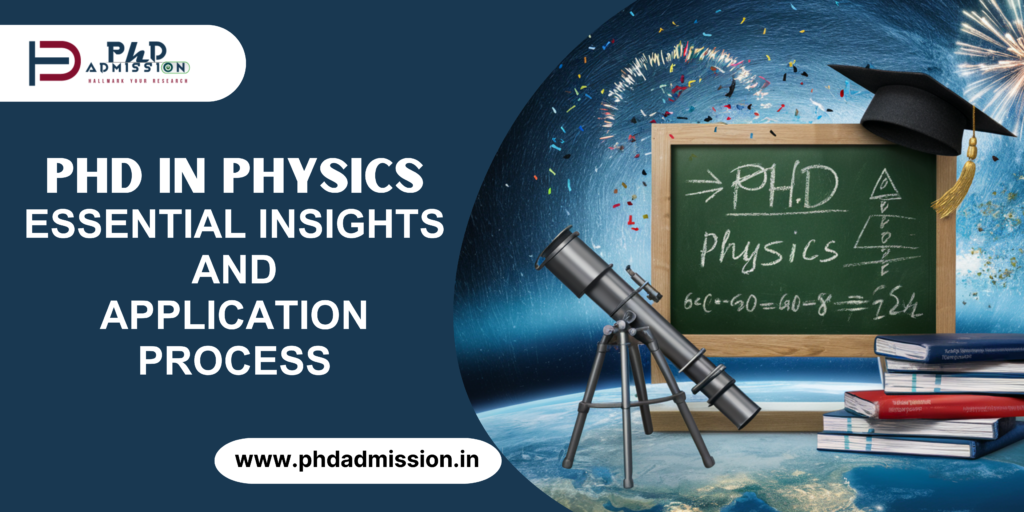If you’re looking to pursue a PhD in physics, then it’s important to understand all the crucial aspects. The study of physics is broad, but there are still some fundamental concepts that all physicists must learn. Let’s know more fundamental aspects so that when you apply for your PhD program or begin researching on your own, you’ll be ready and updated with your entire PhD in Physics.
Table of Content
What is PhD in Physics?
If you want to be a scientist, the PhD in Physics is the best course to choose. A PhD program requires hard work and dedication, but it also provides a lot of opportunities for personal development and growth, as well as an excellent salary package. If you’ve been considering pursuing this path but aren’t sure if it’s right for you or not, here are some key findings that every prospective student should know
- The PhD program will require additional coursework beyond what’s required for an undergraduate degree. This includes courses like quantum mechanics or statistical mechanics that may seem intimidating at first glance but can be quite fun.
- PhD in Physics is a research degree that prepares its graduates to apply their knowledge and skills to the field of physics. It is also a degree that provides an opportunity to learn more about the world in which we live.
- The PhD in Physics can be obtained by completing a PhD program at a university or college. A PhD program takes four years to complete and includes both classroom studies and research seminars.
- The coursework includes courses in mathematics, physics, chemistry and computer science, field trips and involvement in laboratory experiments. To be eligible for admission into a PhD program, you must have completed your bachelor’s degree with good grades before entering the program.
- The purpose of studying physics is understanding how nature delves and how it works at smallest levels (atomic particles). These are called elementary particles because they are so small that they cannot be seen using the naked eye or even a microscope.
The Five steps to becoming a Doctorate:

A PhD is a doctorate in science and engineering. It’s often referred to as a “PhD” or “Doctor of Philosophy” when shortened to just “PhD.”
A master’s degree is typically awarded by universities after completing an undergraduate program that takes about two years. Master’s programs are designed to educate students on specific knowledge that they will need to pursue their career path within academia or industry.
A PhD program lasts three years, which means you’ll have spent roughly three years on your studies before graduating with this advanced degree!
What is the Study of PhD in Physics?
The study of PhD in Physics is a broad subject that examines the nature of phenomena and their causes. The field encompasses many areas, including:
- Quantum mechanics, which studies matter at its most fundamental level
- Elementary particles and forces, including electromagnetism and gravitation
- Nuclear physics, which deals with the composition and structure of atoms (and nuclei)
- Atomic physics, which focuses on chemical reactions between particles in matter
The different areas of Research for a PhD in Physics:
The different areas of research for a PhD in physics include:
- Experimental physics. This is where you conduct experiments and investigate fundamental laws of nature, such as the laws governing electrons and photons.
- Quantum optics. You study how light behaves when it interacts with matter on very small scales, the atomic scale which is called quantum world.
- Condensed matter physics (including solid state physics). This area studies solids under high pressure or temperature conditions, which can be found in nature or produced by humans in laboratories like nuclear reactors or other industrial facilities where gases are condensed onto surfaces to create new materials that have unique properties not found anywhere else on Earth (or even out there).
Major subjects
Physics majors have options available to them in a variety of industries, including:
- Aerospace
- Chemical Engineering
- Civil Engineering
- Electrical Engineering
- Materials Engineering
- Mechanical Engineering
Having a PhD in Physics opens many different career options. It can be used in research, teaching and industry.
For Research
If you decide to pursue research, there are many opportunities for people with PhDs in Physics to work on projects that could lead to new discoveries and technologies. You may be able to work as a postdoctoral researcher or assistant professor at an academic institution where you study on your own time; this allows you more flexibility than if you were working full-time as an employee (or contractor).
For Teaching
Another option is teaching at a college or university level either part-time or full-time depending on what type of job opportunity presents.
This can also be done while still pursuing scientific pursuits such as getting involved with research projects or even starting up their own businesses based off those studies.
Application process for a PhD in Physics
- You will need to apply to a university.
- You may be required to take an entrance exam.
- You will need to submit a research proposal and personal statement.

Final Thoughts
Becoming a PhD in Physics is a great career choice. It opens many different career options, such as in research and teaching at universities or research institutions, working for government organizations or companies, working with scientists from other fields of science and helping them with their research projects. With this course you can open doors to a wide range of career possibilities. A PhD in Physics is everything you need to get into the divine world of PhD in Physics.




